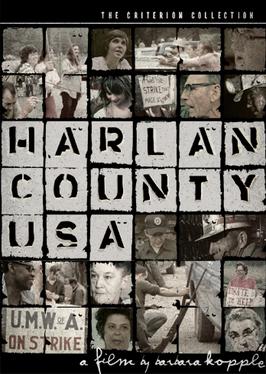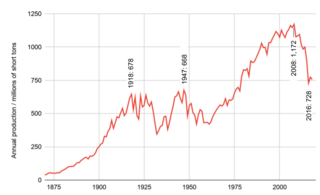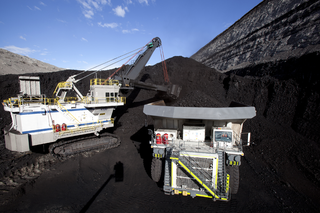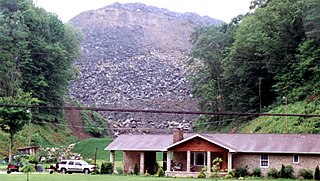Related Research Articles

Harlan County is a county located in southeastern Kentucky. As of the 2020 census, the population was 26,831. Its county seat is Harlan. It is classified as a moist county—one in which alcohol sales are prohibited, but containing a "wet" city—in this case Cumberland, where package alcohol sales are allowed. In the city of Harlan, restaurants seating 100+ may serve alcoholic beverages.

Cumberland is a home rule-class city in Harlan County, Kentucky, in the United States. The population according to the 2010 Census was 2,237, down from 2,611 at the 2000 census. The city sits at the confluence of Looney Creek and the Poor Fork Cumberland River.

Harlan County, USA is a 1976 American documentary film covering the "Brookside Strike", a 1973 effort of 180 coal miners and their wives against the Duke Power Company-owned Eastover Coal Company's Brookside Mine and Prep Plant in Harlan County, southeast Kentucky. It won the Academy Award for Best Documentary at the 49th Academy Awards.

Surface mining, including strip mining, open-pit mining and mountaintop removal mining, is a broad category of mining in which soil and rock overlying the mineral deposit are removed, in contrast to underground mining, in which the overlying rock is left in place, and the mineral is removed through shafts or tunnels.

Massey Energy Company was a coal extractor in the United States with substantial operations in West Virginia, Kentucky and Virginia. By revenue, it was the fourth largest producer of coal in the United States and the largest coal producer in Central Appalachia. By coal production weight, it was the sixth largest producer of coal in the United States.

The Harlan County War, or Bloody Harlan, was a series of coal industry skirmishes, executions, bombings and strikes that took place in Harlan County, Kentucky, during the 1930s. The incidents involved coal miners and union organizers on one side and coal firms and law enforcement officials on the other. The Harlan County coal miners campaigned and fought to organize their workplaces and better their wages and working conditions. It was a nearly decade-long conflict, lasting from 1931 to 1939. Before its conclusion, an unknown number of miners, deputies and bosses would be killed, state and federal troops would occupy the county more than half a dozen times, two acclaimed folk singers would emerge, union membership would oscillate wildly and workers in the nation's most anti-labor coal county would ultimately be represented by a union.
Consol Energy Inc. is an American energy company with interests in coal headquartered in the suburb of Cecil Township, in the Southpointe complex, just outside Pittsburgh, Pennsylvania. In 2017, Consol formed two separate entities: CNX Resources Corporation and CONSOL Energy Inc. While CNX Resources Corp. focuses on natural gas, spin-off Consol Mining Corporation, now Consol Energy Inc. focuses on coal. In 2010, Consol was the leading producer of high-BTU bituminous coal in the United States and the U.S.'s largest underground coal mining company. The company employs more than 1,600 people.
International Coal Group, Inc. (ICG), is a company headquartered in Teays Valley, West Virginia that was incorporated in May 2004 by WL Ross & Co for the sole purpose of acquiring certain assets of Horizon. ICG eventually operated 12 mining complexes in Northern and Central Appalachia and one complex in the Illinois Basin. In November 2005, ICG had a stock offering on the New York Stock Exchange. In 2011 ICG became a subsidiary of Arch Coal, Inc in 2011.

Peabody Energy is a coal mining company headquartered in St. Louis, Missouri. Its primary business consists of the mining, sale, and distribution of coal, which is purchased for use in electricity generation and steelmaking. Peabody also markets, brokers, and trades coal through offices in China, Australia, and the United States.

Robert Edward Murray was an American mining engineer and businessman. He founded and was the chief executive officer of Murray Energy, a mining corporation based in St. Clairsville, Ohio, until it filed for bankruptcy. Murray was criticized for his denial of climate change, his actions following the Crandall Canyon Mine collapse, and for several large SLAPP suits he initiated. Multiple allegations of sexual misconduct were brought against him in 2014 and 2016, which were later settled out of court.
Arch Resources, previously known as Arch Coal, is an American coal mining and processing company. The company mines, processes, and markets bituminous and sub-bituminous coal with low sulfur content in the United States. Arch Resources is the second-largest supplier of coal in the United States, behind Peabody Energy. As of 2011 the company supplied 15% of the domestic market. Demand comes mainly from generators of electricity.

Coal mining is an industry in transition in the United States. Production in 2019 was down 40% from the peak production of 1,171.8 million short tons in 2008. Employment of 43,000 coal miners is down from a peak of 883,000 in 1923. Generation of electricity is the largest user of coal, being used to produce 50% of electric power in 2005 and 27% in 2018. The U.S. is a net exporter of coal. U.S. coal exports, for which Europe is the largest customer, peaked in 2012. In 2015, the U.S. exported 7.0 percent of mined coal.

The history of coal mining in the United States starts with the first commercial use in 1701, within the Manakin-Sabot area of Richmond, Virginia. Coal was the dominant power source in the late 1800s and early 1900s, and although in rapid decline it remains a significant source of energy in 2023.
Mining in the United States has been active since the beginning of colonial times, but became a major industry in the 19th century with a number of new mineral discoveries causing a series of mining rushes. In 2015, the value of coal, metals, and industrial minerals mined in the United States was US$109.6 billion. 158,000 workers were directly employed by the mining industry.
Alpha Metallurgical Resources is a large American producer of metallurgical coal for the industrial production of steel and iron and low-sulfur thermal coal to fuel steam boilers for the production of electrical power. In November, 2018 the company was acquired by Contura Energy. The company also provides industry services relating to equipment repairs, road construction and logistics, with domestic operations and coal reserves within the states of Virginia, West Virginia, Kentucky, Wyoming, Utah, Illinois, Tennessee, and Pennsylvania. Alpha Natural Resources does not produce all of the coal it sells; much of the coal sold by Alpha Natural Resources is purchased from independent mining operations and then resold in the worldwide market.

Coal mining in Wyoming has long been a significant part of the state's economy. Wyoming has been the largest producer of coal in the United States since 1986, and in 2018, coal mines employed approximately 1% of the state’s population. In 2013, there were 17 active coal mines in Wyoming, which produced 388 million short tons, 39 percent of all the coal mined in the US, and more than three times the production of second-place West Virginia. Market forces, including the low price of natural gas from the fracking boom—coal's main competition—contributed to the steep drop in coal production in the 2000s as electricity generation switched from coal to gas.
Mountain Justice is a grassroots movement established in 2005 to raise worldwide awareness of mountaintop removal mining and its effects on the environment and peoples of Appalachia. The group seeks to encourage conservation, efficiency, solar and wind energy as alternatives to all forms of surface mining. It self-describes as "a regional Appalachian network committed to ending mountaintop removal". It seeks justice because the mountaintop removal (MTR) it opposes is a form of coal mining known as mountaintop removal mining which produces coal sludge toxic waste which is stored in a dam on the mountain and leaches into the groundwater, which poisons the environment, which defaces the top of the mountain, and which is not stopped due to political corruption.

The Hobet 21 Coal Mine in West Virginia was operational between 1974 and 2015. Straddling the border of Boone County and Lincoln County in the Appalachian Mountains, the Hobet 21 mine was one of the largest mountaintop-removal coal mining operations in West Virginia. Originally owned by Fil Nutter, the mine used both underground mining and strip mining techniques, and later even more intensive surface mining using a dragline. Increasing productivity and profitability encouraged workers to successfully strike for their health plan in 1993, which resulted in unusually thorough coverage for mine workers at this time. The Hobet mine was incorporated into Arch Coal in 1997, along with several other mines, following booming coal demand. The mine was sold two more times: to Magnum Coal in 2005 and to Patriot Coal in 2008. Patriot Coal subsequently went bankrupt in 2015, and the Hobet site was passed into a Virginia-based conservation firm who continued to mine the land while reclaiming and planting trees to offset carbon emissions for other companies.

Environmental justice and coal mining in Appalachia is the study of environmental justice – the interdisciplinary body of social science literature studying theories of the environment and justice; environmental laws, policies, and their implementations and enforcement; development and sustainability; and political ecology – in relation to coal mining in Appalachia.
The 2019 Harlan County coal miners' protest was a labor protest held by dozens of coal miners in Cumberland, Kentucky. The causes of the protest stemmed from the 2019 bankruptcy of Blackjewel Coal, a coal mining company that operated a mine in the county. Following the company's bankruptcy, former coal miners did not receive payment for several weeks of work, leading to many miners protesting by blocking a coal train on tracks in the county. The protest lasted from July 29 to September 26, with litigation continuing in bankruptcy courts.
References
- 1 2 3 4 5 Bruggers, James (2021-03-20). "A Bankruptcy Judge Lets Blackjewel Shed Coal Mine Responsibilities in a Case With National Implications". Inside Climate News. Retrieved 2021-03-29.
- 1 2 3 4 "A 'smoking hole in the ground': Blackjewel's coal bankruptcy plan raises concern". www.spglobal.com. Retrieved 2021-03-29.
- ↑ "Lawyers liquidating Blackjewel coal company accuse founder of extracting millions in improper transactions - Lane Report | Kentucky Business & Economic News" . Retrieved 2021-03-29.
- 1 2 3 James, Connor. "Beyond Blackjewel: The impact of the infamous bankruptcy one year later". www.wymt.com. Retrieved 2021-03-29.